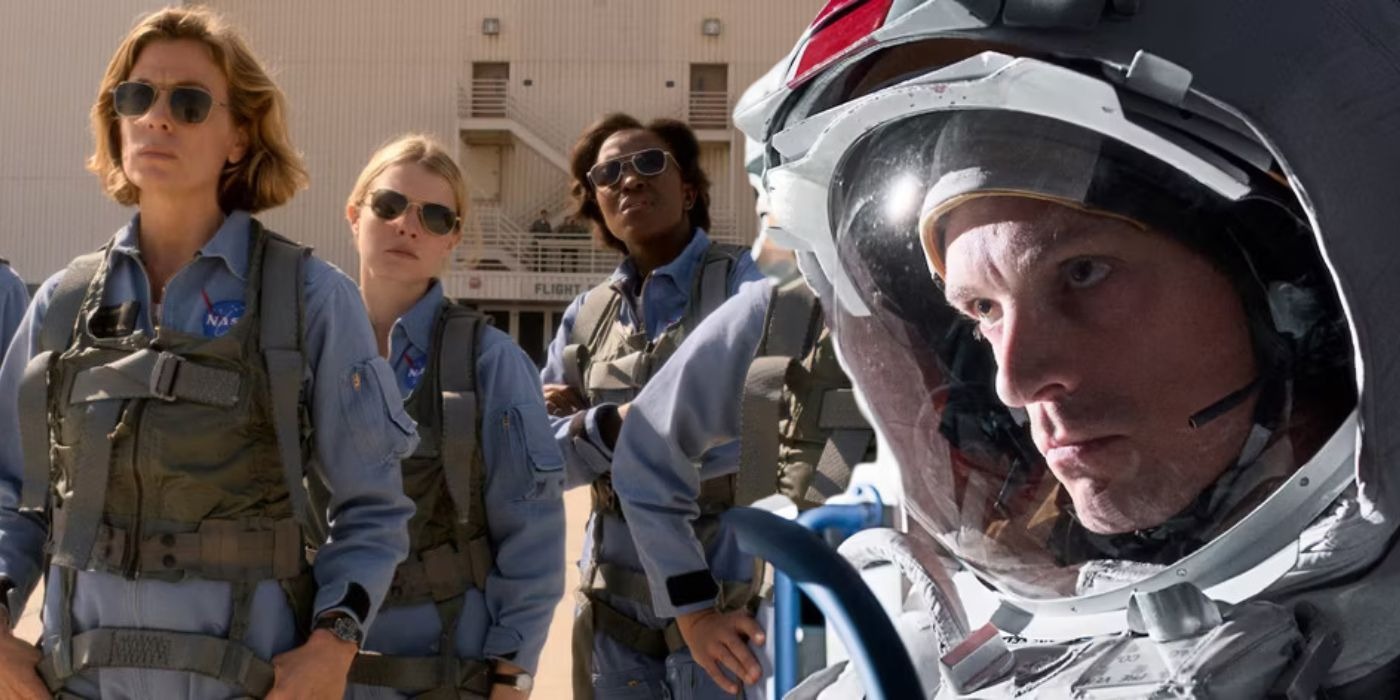Things took a new turn when news broke that a Russian cosmonaut was the first human to walk on the moon. This development left many at NASA, especially Edward Baldwin, feeling disappointed and let down by their organization.
While a journalist visited the outpost bar in search of genuine reactions from the astronauts, most of them pretended to support NASA and explained that a moon landing wasn’t something simple. But Edward, influenced by alcohol, went beyond the line and poured out his frustrations.

He claimed he could have been the first on the moon if Apollo 10 had been allowed to land. He criticized NASA for being too cautious, blaming their over-careful approach for missing such an opportunity.
The comments found their way to the public through a published report, and as a result, Baldwin was taken off flight duty. Annoyed by what had happened, he began to consider returning to Vietnam as a pilot. At the same time, Neil Armstrong was sent on the Apollo 11 mission and successfully made it to the moon.
Despite the risk involved in the final landing, Neil made the bold decision himself, which made Baldwin realize that he alone was responsible for not acting when he had the chance. Nixon’s administration started pushing for a military base on the moon, but Wernher von Braun strongly objected.
He believed research and discovery were the real reasons they had gone into space, not to start another war. Because of his refusal, the government began investigating his past. They even wanted Baldwin to repeat his earlier criticisms publicly, especially before Congress.
However, Baldwin used that moment to clarify that Apollo 10 was only a rehearsal and not designed to land. He admitted that if he had truly wanted to land, he should have acted on his own.
Despite his openness, his speech had no effect. Once Wernher’s Nazi history was confirmed—showing he used concentration camp prisoners for labor—he was dismissed. Although he claimed he had no power to change those things back then, no one could work closely with someone with such a past.
After the Americans got their man to the moon, the Soviets scored again by becoming the first to send a woman. The pressure now fell on the US to send American women, but the space program had very few female pilots. Mercury 13, an earlier training program for women, had already been shut down.
Still, officials considered selecting candidates from the Mercury 13 group, and those who showed promise were allowed to become astronauts.
What Was The Purpose Of Apollo 15?
Once women were brought into the space program, Kate Baldwin, the wife of Ed Baldwin, felt insulted. She especially took issue with Tracey Stevens—wife of astronaut Gordon Stevens—joining the program.
These women had always been behind their husbands, giving support through tough missions, and now some of them were training for space themselves. Kate and others couldn’t understand how housewives could suddenly take on roles that men had trained for over years.
The debate continued, but finally, four women made it through, and Tracey Stevens was among them. At first, others didn’t take her seriously due to her marriage to an astronaut, but she went on to prove herself. Molly Cobb emerged as the standout.
She wasn’t only an experienced pilot but also scored very high throughout the program. Molly Cobb was picked to go on Apollo 15 with Edward Baldwin. Their mission focused on searching for ice on the moon’s surface. Research by NASA suggested there was a strong chance that ice could be found there.
If discovered, this ice would be used to create fuel, strengthening their reason to remain on the moon long-term. As women’s rights were becoming more recognized, a female presence on the moon became a powerful statement. Many young girls wrote to Molly, sharing how her achievement inspired them to think bigger. Girls could now imagine becoming astronauts, engineers, or scientists. Molly’s presence symbolized a new path for women everywhere.
On launch day, as Apollo 15 prepared to take off, all the astronauts’ wives gathered to watch. Interestingly, Molly’s husband, Wayne Cobb, joined the group. While most of the women, especially Kate, acted unbothered, Wayne struggled with fear and anxiety.
His nightmares about his wife’s safety made things harder for him. Although Kate always acted like nothing fazed her, it later became clear that she, too, carried a heavy emotional burden. She had always been Baldwin’s pillar—whether during space missions or his military service in Korea.
‘For All Mankind’ Season 1: Ending Explained – Was Apollo 24 A Success? How Did Baldwin Help In The Process?
Edward Baldwin joined Gordo Stevens and Danielle Poole on the Apollo 22 mission. Their goal was to replace the Apollo 21 team, who had been maintaining the base at Jamestown. Apollo 23 was meant to arrive shortly after, but a pre-launch explosion caused a delay, leaving the Apollo 22 crew stranded for longer than expected.
This unexpected delay weighed heavily on Gordo’s mind. The repetitive days in space affected his mental health, and he eventually began to hallucinate. During one of their spacewalks, he imagined ants crawling on his body.
When they later discussed the event, he admitted that he couldn’t understand what had gone wrong. Seeing the danger in Gordo’s mental state, Baldwin told Danielle to escort him back to Earth on Apollo 22’s Command and Service Module.
But Danielle knew the consequences—if NASA found out about Gordo’s condition, he would lose his career. Having watched her boyfriend suffer job loss after returning from Vietnam, she understood the damage that could do.
So, Danielle injured herself on purpose and took the blame, allowing Gordo to return home as a hero, while her incident stirred doubts about women’s ability in space. Baldwin was now alone on the moon. He noticed a Soviet structure nearby and started to suspect they were secretly collecting data from the American base.
He installed a camera to monitor their actions. Back on Earth, tragedy struck when Baldwin’s son, Shane, suffered a severe accident and was declared brain dead. Kate still clung to hope and asked NASA’s doctor to re-evaluate him, but the results remained the same.
She chose not to tell Edward immediately, holding on to hope for a miracle. Even though others agreed with her decision, the truth remained hidden from Baldwin. The only clue he received came from the Soviets, who offered condolences. He assumed it was psychological warfare and, in anger, destroyed their equipment.
When Kate eventually informed him of Shane’s death, Baldwin was shattered. Regret filled him—he hadn’t spent enough time with his son, and learning of his passing while still on the moon broke him completely. He stopped talking to anyone on Earth and drowned himself in alcohol.

While this was happening, Apollo 24 was getting ready to bring Baldwin home. The crew included Deke Slayton, Ellen Waverly, and Harrison Liu. Though the launch was successful, their flight computer failed. To assist them, Apollo 25—manned by Molly Cobb and Tracey Stevens—attempted to fix the issue.
Deke and Harrison carried out the exchange, but tragedy struck when Harrison was killed due to an unexpected S-IVB ignition. Molly was also left floating in space, and Apollo 24 lost its course. With Deke injured and fuel exhausted, Ellen and Deke assumed their mission would not end well.
During this desperate moment, Ellen opened up about her personal life. She revealed she loved a woman and had married Larry only to cover the truth and protect her job. Deke advised her to never reveal that to anyone because some would destroy her career for it.
When Baldwin realized the situation was critical, he made contact with headquarters. He was instructed to use the LSAM to provide Apollo 24 with extra fuel. He followed the instructions, and Ellen successfully received the propellant.
But by the time she returned, Deke had passed away. Ellen, now the only surviving member of Apollo 24, told Baldwin to leave Jamestown and return to Earth. Baldwin hesitated—he feared returning to face the painful truth about his son.
Ellen was left in charge of Jamestown, and when she was asked to deliver a message to Earth, she chose to express love for her husband. That message was a clear sign she had taken Deke’s advice to heart and had decided not to risk her career by exposing her truth.
“For All Mankind” carries many emotional layers. It looks into the struggles with PTSD among astronauts, especially since anyone who showed signs of trauma was removed from missions.
The series also sheds light on how difficult it was for women to get fair treatment, especially for someone like Danielle, who faced extra challenges as a black woman. Ellen’s situation showed how queer women had to hide their identity to avoid losing everything.
The change in leadership also brought different visions—from Nixon’s dream of military strength on the moon to Kennedy’s focus on research and discovery. These elements all blend into the larger story the show presents.



